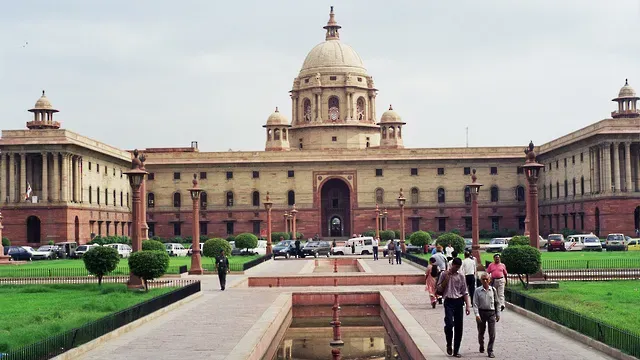The Weekend Read: Should India match China's net zero ambition?
In conversation with climate change policy expert Navroz Dubash

Welcome to this weekend’s edition of Lights On, a newsletter that brings you the key stories and exclusive intel on energy and climate change in South Asia.
In case you missed my Friday story about financing India’s $500 billion energy transition, you can catch up here.
If you are not a subscriber, you can sign up below, for free, or you can support my work by purchasing a membership:

After China unveiled its carbon neutrality target for 2060 last September, a number of big emitters have also come forward with similar plans. Japan, South Korea, France and the UK have committed to a net zero target by 2050. If China’s emissions decrease according to the plan, India is poised to become the next biggest polluter of the developing world, and face all the scrutiny that comes with it.
As countries prepare to raise their ambitions at the next round of climate negotiations in November, should India turn up with its own version of a net zero target?
I unpacked the dilemma with Navroz Dubash, a professor at the Centre for Policy Research who recently wrote an article about this issue for the think tank’s new blog Environmentality.
Lights On: The concept of ‘net zero’ emissions has become an official target for a number of countries this year and others may join in soon. Why are we suddenly talking so much about this particular goal? What has changed in the global climate debate?
Navroz K. Dubash: In the climate debate there's often been a striving for some sort of focal point around which to build political consensus, because it's such a complicated issue. The science of climate change is complex, there's been a history of people with interests trying to undercut science. So how does one communicate both the scale of the problem and the urgency in a way that seems manageable? Over the years, there have been various efforts to try and distill this down to something straightforward.
The two degrees threshold of warming was one such focal point, then at one point, the concept of a peaking year, asking when would emissions peak in a given country. So these are all ideas that helped, in a sense, focus the debate and make it easier to judge what a country is doing.
As you know, in the Paris Agreement’s Nationally Determined Contribution (NDC) world, every country has put its own contribution on the table. And so you have this array of emission reductions in absolute terms, reductions in emissions intensity, which is emissions per unit of GDP, emissions reductions from a baseline.
So how much less are a country's emissions going to be than they otherwise would have been? It's very hard for the public to understand. The idea of net zero has an attractive simplicity around it. And it makes it easier to provide a benchmark for the media, for citizens. Are we on track? Are we not?
But is this target really as simple as it sounds?
There's still a lot of hidden complexity behind the term ‘net’. Net zero basically means that the combination of the emissions and the reduction or the absorption of some emissions through various techniques, will amount to zero. But a lot of the techniques to withdraw greenhouse gases from the atmosphere still tend to be costly. So if a country says, ‘look, we're actually going to continue emitting, but don't worry, we've got it under control, because we will suck a bunch of it out’, there's no way of really contesting that statement, because it's about what will happen 30 years in the future. So it's less clear than it actually seems, but it's certainly much easier to communicate.
Carbon removal is also not easy to measure. Thinking of afforestation goals for example: India pledged to create an additional carbon sink of 2.5 to 3 billion tons through additional forest and tree cover. But there is no clarity over how much carbon these new trees will actually remove from the atmosphere.
Planting trees is one way, but there are all kinds of other ways of doing it. There's carbon capture and storage, which means you capture carbon, and then bury it deep in the ground to store it. There’s even solar radiation management, which basically says we're going to actually prevent that much sunlight actually getting to the earth. So there's all kinds of techniques that are being experimented with, including increasing the absorptive capacity of the oceans, for example. The science and the costs are complicated. And as you say, there is a real measurement issue there as well.
Should India go for net zero?
I'm completely in favor of having a focal point for global policy, but I sometimes worry that the tail shouldn't wag the dog here. We want to not just have countries saying that they're going to do something very progressive, we want to have hard evidence that they will actually do it. So you have got a moment of political pressure building, and I'm a little worried that in some countries where there isn't political support for a net zero target, or a strong mitigation target in general, those countries will say yes to net zero just because it's not very costly to them domestically, it sounds like something well off into the future. But it doesn't actually get them to do something in the short run that will bend the emissions curve. And I think India is one such country.
So what would it mean to India, in practice, to set a net zero target? What would be the economic, environmental and social implications?
One part of the problem is that I don't think we know what the implications are. We are trying to understand what they are through models, but the further out you get in the future with models, the more variables there are, particularly for a country that is growing very rapidly, which is going through major social and economic transitions. So for example, we're going through a demographic transition, we're going through an urbanisation transition, we're going through an infrastructure transition, all of these will substantially determine our carbon footprint.
The key point is that the concrete question about what a net zero future would look like for India has not even been asked by the modeling community yet, they're working on it. But [currently] we don't have the analytical basis to really understand that at the moment.
What do you think India should do at the next climate talks in Glasgow, UK, where many will expect a big pledge from one of the world’s biggest polluters?
I think you can't show up at Glasgow saying ‘it's great that all EU countries have announced a net zero target but we've chosen not to’, because then we will look like we are not ambitious and we don't care about climate change. Net zero targets may drive change in some economies, because you have a lot of political momentum behind it.
Take the UK for example. You have Fridays for Future out there demonstrating for net zero targets, you have industry groups working towards that, you have the climate change committee that has done an analysis to show what that would look like for the UK. It's great to have that kind of target and mobilise your society, but what happens when you don’t have that?
I think India should send the message that these long term targets are great to set aspirations. They're great to send signals to the private sector. But to drive ourselves in the short term we need to have other complementary things and we think that would help other countries too. And those other complementary things are sectoral transition strategies in areas where greenhouse gases are growing a lot. So for a country like the UK, the key is to turn downwards as fast as possible. For a country like India, the key is avoiding emissions, because we are going to emit more. The question is how much more? So you want to find the sectors that are likely to account for the biggest increase and come up with strategies now that bend that curve. That should be our focus. The net zero target doesn't automatically tell you that, but a sectoral strategy will.
Can you give me one practical example of this new strategy?
For example, decarbonisation of electricity. We have a renewable energy target: Can we translate that renewable energy target into a target that also talks about how fast renewables will replace coal? How fast will we move to battery technologies? And what does that shape of decarbonizing electricity look like? Do we have a plan for that? Similarly, with public transport in cities, how do we massively scale up to avoid proliferation of private transport, which will also lead to more livable cities for India and less evolution? These are all things around which we can have concrete plans, and that we can have a conversation about domestically, because it's much less abstract than net zero in 2060.
And I think if India said, ‘the world is asking for more ambition, we agree. But we also want to see more near term implementation,’ it would become the champion of ambition plus implementation. And if you show up with a viable plan, I think that the world community might accept it.
That’s all for today! If you like what you read, please consider signing up for free or as a member:



